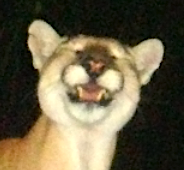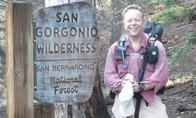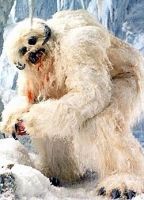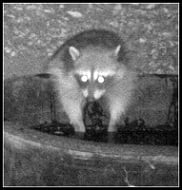Then I saw these:
What made these tracks?
-
hvydrt
- Posts: 494
- Joined: Thu Sep 27, 2007 8:18 pm
Does anyone know what made these tracks:

Then I saw these:


Then I saw these:
-
cougarmagic

- Posts: 1411
- Joined: Wed May 07, 2008 5:21 pm
Hmmm...the melting snow is making the track look bigger than it really was, but even with that, the only animals with a track that size 'round these parts (bigger than the basket on your pole) are bears, lions, and big dogs.
A bear track would be bigger than this, and you would also have seen the tracks of the rear feet, which look human (or like bigfoot, whichever you prefer.. There are no claw marks, so that's also a strike against bear, and also dog. The palm pad is very large, which is a strike against dog too. However....maybe the claw marks have melted away? And the proportions are messed up from the melting?
There are no claw marks, so that's also a strike against bear, and also dog. The palm pad is very large, which is a strike against dog too. However....maybe the claw marks have melted away? And the proportions are messed up from the melting?
If the tracks were in a purposeful straight line, it is probably a cat. Dogs (including foxes and coyotes) are goofy and zig zag all over the place.
I think the reason these are so distorted is because the track is an overlap of a front and a rear paw - the back feet followed exactly where the front feet landed. That's why it looks like there are too many toes.
Where were these?
Here is a clear set of lion tracks I saw last winter near Mt Mooney:

A bear track would be bigger than this, and you would also have seen the tracks of the rear feet, which look human (or like bigfoot, whichever you prefer..
If the tracks were in a purposeful straight line, it is probably a cat. Dogs (including foxes and coyotes) are goofy and zig zag all over the place.
I think the reason these are so distorted is because the track is an overlap of a front and a rear paw - the back feet followed exactly where the front feet landed. That's why it looks like there are too many toes.
Where were these?
Here is a clear set of lion tracks I saw last winter near Mt Mooney:

-
Rumpled
- Posts: 271
- Joined: Mon Feb 25, 2008 10:57 pm
Based upon this website, I'd say cat. Try the X visual
http://www.bear-tracker.com/caninevsfeline.html
http://www.bear-tracker.com/caninevsfeline.html
-
hvydrt
- Posts: 494
- Joined: Thu Sep 27, 2007 8:18 pm
And the proportions are messed up from the melting?
The 2 with the ski poles were at 10,000' just north of San Gorgornio. They seemed fresh but the wind was blowing pretty good. Do cats go up that high in winter? The other one was with in 1 mile of the South Fork Trail head, so at about 7200'. I think that one was definitely messed up from melting, and traffic on the trail.
That is what the ones with the ski basketes were like. A straight path of prints, but it only looked like 2 feet, not 4, so the overlap idea makes sense.tracks were in a purposeful straight line.......because the track is an overlap of a front and a rear paw
From that site Rumpled posted, the first track looks like the front paw of a black bear?
-
cougarmagic

- Posts: 1411
- Joined: Wed May 07, 2008 5:21 pm
Yes, as long as there are deer around - and it would be really unlikely for a bear to be up there now, with all the snow. In the San Gabriels, they don't truly hibernate, but I've read that they do slow way down, nap a lot, and move lower to places with more food and less snow.hvydrt wrote:The 2 with the ski poles were at 10,000' just north of San Gorgornio. They seemed fresh but the wind was blowing pretty good. Do cats go up that high in winter?
It kind of does - that's what I was thinking at first, but the toes are very curved. See how the bear track toes are almost in a straight line across the top? the palm pad does look bear-like though. That's interesting that the first one is in a different place than the other two, because I thought it looked different. yeah - the last two look "fresher" than the first.hvydrt wrote:From that site Rumpled posted, the first track looks like the front paw of a black bear?
Very cool!
-
Hikin_Jim

- Posts: 4688
- Joined: Thu Sep 27, 2007 9:04 pm
I have to laugh. The banner ad for this thread was "Gay Bear Dating." I have no idea what the term "Gay Bear" means in the dating world (unlike "cougar" which I do understand), but I thought it was pretty darn funny that Google thinks we're talking about homosexual bears. 
Aside from that, interesting discussion, guys.
Aside from that, interesting discussion, guys.
-
Zach

- Posts: 522
- Joined: Sun Jan 04, 2009 4:25 pm

Hey can someone identify this footprint. I was discussing it with my cousin who thinks it could be a fox, but the lack of claw-prints make it seem like it could be a bobcat or maybe something else. Also, the animal is laying down sets of 3 prints, which my cousin said is done by a fox when he tracks in his own footprint... do bobcats do that as well?
-
EnFuego

- Posts: 677
- Joined: Mon Dec 15, 2008 11:14 am
[quote="ZachHey can someone identify this footprint. I was discussing it with my cousin who thinks it could be a fox, but the lack of claw-prints make it seem like it could be a bobcat or maybe something else. Also, the animal is laying down sets of 3 prints, which my cousin said is done by a fox when he tracks in his own footprint... do bobcats do that as well?[/quote]
I'd say fox too.
I'd say fox too.
-
cougarmagic

- Posts: 1411
- Joined: Wed May 07, 2008 5:21 pm
I think this is a fox, at a "lope" speed. I have a really great tracking book - "Mammal Tracks and Sign" by Mark Elbroch. Apparently the whole book is online at Google Books - so I saved a couple of screenshots of the diagrams. But if you want, the link to the book is here:
http://tinyurl.com/chm8po
The gray fox stuff starts on page 148.




It says that gray fox claws are semi-retractable, so they don't always show. They look more symmetrical, and more compact than a bobcat track to me. A bobcat would have a "leading" second toe, and the track looks "round" . A canine track is oval, and the toes are close together. But both foxes and bobcats do walk where they put one foot exactly in the track of another (that's called a "direct register" walk)
I'm actually really surprised at the apparent lack of bobcats - I have only ever gotten one trailcam picture of one, and almost never see tracks. There's more mountain lion sign around than bobcat, that's for sure. Seems like it should be the other way around.
http://tinyurl.com/chm8po
The gray fox stuff starts on page 148.




It says that gray fox claws are semi-retractable, so they don't always show. They look more symmetrical, and more compact than a bobcat track to me. A bobcat would have a "leading" second toe, and the track looks "round" . A canine track is oval, and the toes are close together. But both foxes and bobcats do walk where they put one foot exactly in the track of another (that's called a "direct register" walk)
I'm actually really surprised at the apparent lack of bobcats - I have only ever gotten one trailcam picture of one, and almost never see tracks. There's more mountain lion sign around than bobcat, that's for sure. Seems like it should be the other way around.
-
hvydrt
- Posts: 494
- Joined: Thu Sep 27, 2007 8:18 pm
I have seen 3 bobcats in the Santa Ana Mountains and 2 in the San Bernardino. Never seen one in the San Gabriel.cougarmagic wrote: I'm actually really surprised at the apparent lack of bobcats - I have only ever gotten one trailcam picture of one, and almost never see tracks. There's more mountain lion sign around than bobcat, that's for sure. Seems like it should be the other way around.
-
Zach

- Posts: 522
- Joined: Sun Jan 04, 2009 4:25 pm
I've only heard of gray fox populations on Catalina Island. Are they in the San G's too?
-
cougarmagic

- Posts: 1411
- Joined: Wed May 07, 2008 5:21 pm
The Catalina Island fox is its own subspecies - you hear about them a lot because they're endangered. They are a descendant of the much more common, more generic Gray Fox, which is very much not endangered. They're the most common animal I get on the trail cameras. I haven't ever seen a live one in person, but I have seen a couple of them dead on ACH. I think they are mostly nocturnal.Zach wrote:I've only heard of gray fox populations on Catalina Island. Are they in the San G's too?
-
Mike P

- Posts: 1005
- Joined: Tue Oct 02, 2007 10:48 pm
The gray fox is quite common in lower elevations. I see them very frequently in Glendora. Not sure how high they go into the mountains, though... The gray fox population in the urban/wildland interface has recently taken a beating, though, due to canine distemper.
As for bobcats: I have seen many bobcats (too many to count over the years) in the front range, as well.
As for bobcats: I have seen many bobcats (too many to count over the years) in the front range, as well.
